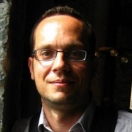

Eric Kansa is being honored as a Champion of Change for the vision he has demonstrated and for his commitment to open science.
Many people will remember the closing scene of Raiders of the Lost Ark, where the artifact at the center of the movie's plot ends up in a vast warehouse, presumably never to be seen again. Many people don't realize that scene, more than any other aspect of the movie, reflects something of the reality of archaeology in practice. Here's how -
Archaeology explores the history and development of people and societies through the documentation and analysis of the physical remains of human activities. While most people think archaeology focuses on artifacts, artifacts are only part of the picture. In fact, artifacts mean very little without detailed information about context - the position and relationships between artifacts, other finds (food remains, architectural debris, etc.,) stratigraphy (layering of deposits,) and other lines of evidence. Archaeologists today build complex databases to fully document and describe artifacts, other finds, and critical contextual information. Without sharing and preserving this data, artifacts can easily be as “lost” as the Ark hidden away in the warehouse.
For a variety of reasons, archaeologists find it difficult to share and preserve this irreplaceable information that is key to understanding ancient societies. That's what motivated Eric Kansa and Sarah Whitcher Kansa, ten years ago, to step out of the traditional academic career path, launch a nonprofit “start-up” (the Alexandria Archive Institute,) and develop Open Context, a system that provides new ways for archaeologists to publish the full richness of the data they create. A key innovation, Open Context helps to advance data sharing as a form of publication. This means Open Context not only works to archive data for preservation, but it also works to expand the quality and expressive power of data, and to make open data a rich and meaningful part of scientific communications. This approach can free archaeology from the confines of the ivory tower, and make data accessible to everyone, to advance research, to teach, or to simply appreciate and enjoy.
Open Context stands as one of many efforts working to make our knowledge of the human experience, our evolution and cultural heritage, freely available for exploration and debate. Open Context publishes editorially-vetted, peer reviewed data and archives this content with the California Digital Library, a vast repository preserving information from many disciplines. Leveraging the power of the Web, Open Context links its published content with other data published by museums, online maps, Wikipedia, and other open databases and digital archives (see here and here) shared by researchers worldwide.
This rich linking helps identify unexpected connections across the Web. For example, the Open Context team is working with the Encyclopedia of Life to link archaeological data that documents how ancient people domesticated animals in the Middle East together with databases that encode relationships between genes and the physiological processes involved in growth and development in people and animals. Open access and open data helps us to realize the rich interconnections between all areas of knowledge, spanning across the humanities, the natural sciences, and medicine.
Archaeology is inherently multidisciplinary, requiring collaboration between natural scientists, social scientists, and humanists. In working to meet archaeology's data needs, the Open Context team gained invaluable experience and expertise, now applied in other areas of open science. Eric Kansa has used this experience to help open data and open government efforts in public health and with NASA, and he even participated a panel discussion on information architectures for open government with Vivek Kundra, the first CIO of the United States (see here and here.)
Open Data has a vibrant and growing community, which freely shares knowledge and innovations, and is working together to solve problems. It's a network that breaks down legal, technical and bureaucratic barriers to foster collaboration. This network also works to reclaim and reinvigorate notions of the “public good,” an ideal long undermined by narrow interests that have co-opted so much of our public investment in research and education.
Since its inception, Open Context has aimed to make research outcomes freely accessible to the widest possible community. Yet for openness to work, it cannot only be about the data outputs of research - we also have to care about the inputs. Eric Kansa's collaboration with IPinCH, an international effort exploring intellectual property and privacy issues in different cultural settings, shows that research impacts many communities. Those communities need to have a say in how research is conducted and how research outcomes should be communicated.
In that vein, the Open Context team is also beginning a new program, aimed at the next generation of researchers, to develop expertise in the technical, theoretical and ethical challenges inherent in data. This will help students not only to better adapt to a radically changed professional environment, but also to become future leaders in creating and using data with greater thought and care – a critical need given the expanding role of data in virtually every aspect of our lives.
The Open Context team is grateful to the American public, which has supported their work through grants from the National Endowment for the Humanities and the National Science Foundation. Additional funding has come from the William and Flora Hewlett Foundation, the Alfred P. Sloan Foundation, the American Council of Learned Societies, and others.
Eric Kansa is an Archaeologist.


